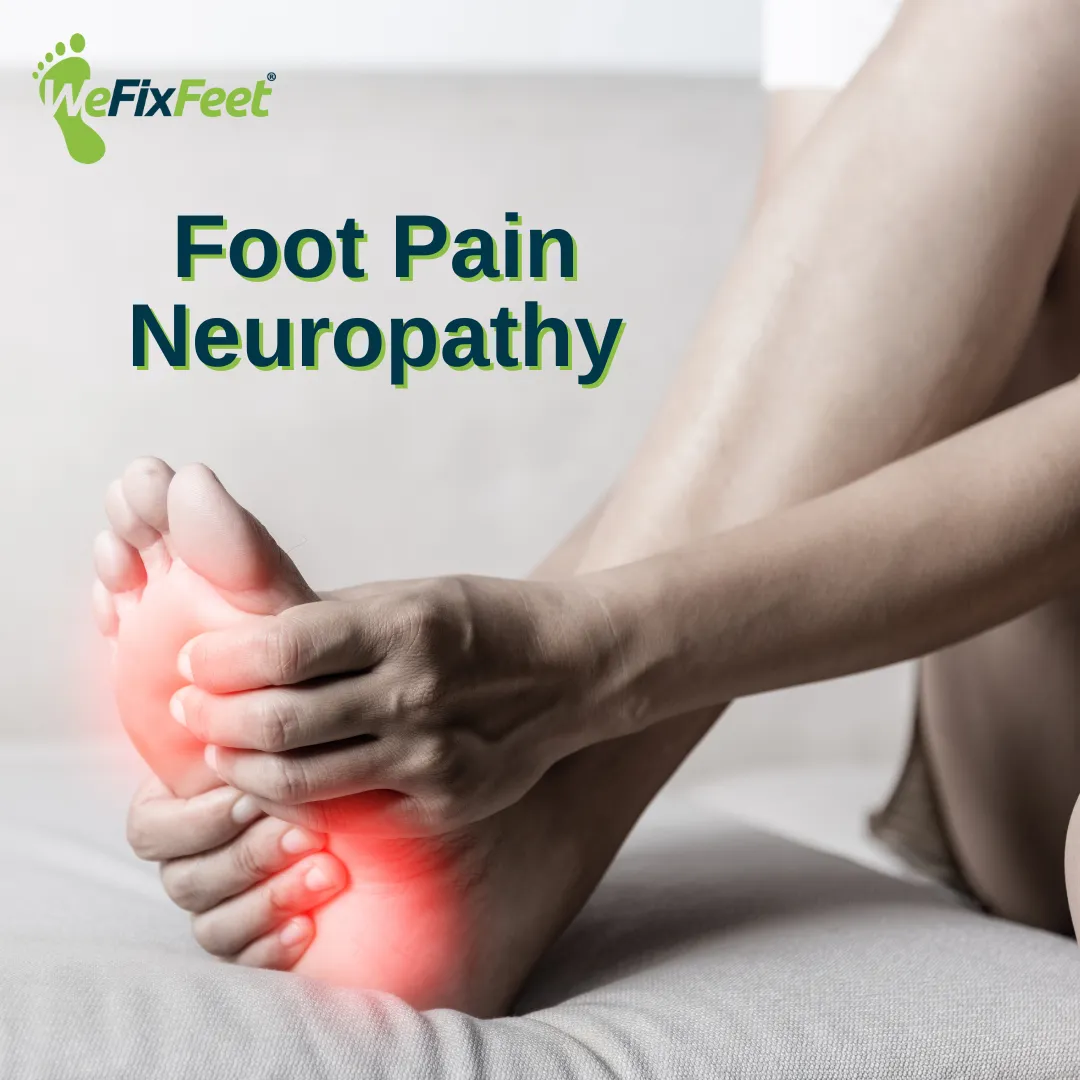
Is Foot Pain Neuropathy and What Causes It? Understanding the Symptoms and Treatments

Is Foot Pain Neuropathy and What Causes It? Understanding the Symptoms and Treatments
Foot pain can be a troubling experience, impacting your mobility and overall quality of life. While foot pain can stem from various sources, one potential cause that often gets overlooked is neuropathy. But what exactly is neuropathy, and could it be the reason behind your foot pain? Let’s explore this condition, its causes, symptoms, and the treatments available to help you manage and alleviate your discomfort.
Neuropathy, also known as peripheral neuropathy, is a condition that occurs when the peripheral nerves—the nerves outside of the brain and spinal cord—are damaged. These nerves play a crucial role in transmitting signals between your central nervous system and the rest of your body. When they are damaged, it can lead to pain, numbness, and weakness, primarily in the hands and feet.
Foot pain neuropathy is indeed a common manifestation of peripheral neuropathy. The symptoms of neuropathy in the feet can vary but often include:
Tingling or burning sensations
Sharp, jabbing, or electric-like pain
Sensitivity to touch
Numbness or reduced ability to feel pain or temperature changes
Muscle weakness or paralysis
Loss of coordination and balance
The onset of these symptoms can be gradual, and they may worsen over time if left untreated. It’s essential to understand the underlying causes of neuropathy to effectively manage and treat the condition.
Causes of Neuropathy:
There are numerous potential causes of neuropathy, including:
Diabetes:
Diabetes is one of the most common causes of peripheral neuropathy. High blood sugar levels can damage nerves over time, leading to diabetic neuropathy. This condition often affects the feet and can cause significant pain and discomfort.
Injuries:
Physical trauma or injuries, such as fractures, falls, or accidents, can damage the peripheral nerves. Repetitive stress or prolonged pressure on the nerves, such as from standing or walking for extended periods, can also lead to neuropathy.
Infections:
Certain infections, such as shingles, Lyme disease, HIV/AIDS, and hepatitis C, can cause nerve damage and result in neuropathy. These infections can directly affect the nerves or lead to inflammatory responses that damage nerve tissue.
Autoimmune Diseases:
Conditions like rheumatoid arthritis, lupus, and Guillain-Barre syndrome involve the immune system attacking the body's own tissues, including nerves. This immune response can lead to nerve inflammation and damage, resulting in neuropathy.
Vitamin Deficiencies:
Deficiencies in essential vitamins, particularly B vitamins, can lead to nerve damage. Vitamin B12, B6, and folate are crucial for nerve health, and a lack of these vitamins can impair nerve function.
Genetic Disorders:
Some inherited conditions, such as Charcot-Marie-Tooth disease, can cause peripheral neuropathy. These genetic disorders affect the structure and function of peripheral nerves, leading to progressive nerve damage.
Chronic Diseases:
Chronic conditions like kidney disease, liver disease, and hypothyroidism can contribute to the development of neuropathy. These diseases can affect the body's ability to maintain healthy nerves and contribute to nerve damage.
Effective Treatments:
Managing neuropathy involves addressing the underlying cause, relieving symptoms, and preventing further nerve damage. Here are some effective treatments to consider:
1. Medication:
Over-the-counter pain relievers, such as ibuprofen or acetaminophen, can help manage mild pain. For more severe pain, prescription medications such as anticonvulsants, antidepressants, or opioids may be necessary. Medications like gabapentin and pregabalin are commonly used to treat nerve pain.
2. Physical Therapy:
Physical therapy can help improve muscle strength, coordination, and balance. A physiotherapist can design a personalised exercise program to enhance mobility and reduce pain. Techniques such as transcutaneous electrical nerve stimulation (TENS) may also be used to provide relief.
3. Nutritional Supplements:
If vitamin deficiencies are contributing to neuropathy, taking nutritional supplements can help. Vitamin B12, B6, and folate supplements can support nerve health and improve symptoms. It’s essential to consult with a healthcare professional before starting any supplements.
4. Pain Management Techniques:
Techniques such as acupuncture, massage therapy, and mindfulness meditation can help manage chronic pain. These complementary therapies can provide relief by promoting relaxation, reducing stress, and improving overall well-being.
5. Lifestyle Changes:
Making lifestyle changes can significantly impact the management of neuropathy. Maintaining healthy blood sugar levels through diet and exercise is crucial for individuals with diabetes. Avoiding alcohol, quitting smoking, and adopting a balanced diet rich in nutrients can also support nerve health.
6. Assistive Devices:
Using assistive devices such as orthotic inserts, braces, or splints can help support weakened muscles and improve mobility. These devices can reduce pressure on the affected nerves and alleviate pain.
Preventing Neuropathy:
Preventing neuropathy involves taking proactive steps to maintain overall health and protect your nerves. Here are some tips to keep in mind:
Manage Chronic Conditions: Properly managing chronic conditions such as diabetes, kidney disease, and autoimmune diseases can help prevent nerve damage.
Healthy Lifestyle: Adopting a healthy lifestyle that includes regular exercise, a balanced diet, and avoiding smoking and excessive alcohol consumption can support nerve health.
Protect Your Feet: Wear comfortable, well-fitting shoes to prevent injuries and reduce pressure on your feet. Regularly check your feet for any signs of injury or infection, especially if you have diabetes.
Maintain a Healthy Weight: Maintaining a healthy weight can reduce the risk of developing conditions that contribute to neuropathy, such as diabetes and hypertension.
Understanding whether your foot pain is caused by neuropathy is essential for finding effective relief and improving your quality of life. By identifying the underlying cause and seeking appropriate treatment, you can manage your symptoms and prevent further nerve damage.
If you’re experiencing foot pain and suspect it may be related to neuropathy, don’t hesitate to seek professional help. Contact We Fix Feet for a comprehensive evaluation and personalised treatment plan. Book an appointment online or call us at 0115 9328832 to start your journey towards pain-free living and optimal foot health.
Ask The We Fix Feet Team
Fill in the form to request a Call From Our Team
One of our team will call you for FREE and answer any questions or concerns you may have about your uncomfortable foot condition

Where To Find We Fix Feet
Our We Fix Feet podiatry clinics are conveniently located in Ilkeston, Derbyshire and Beeston, Nottinghamshire
Open: Mon-Fri 09:00-17:00 / Sat 09:00-13:00
94 Bath Street, Ilkeston, Derbyshire DE7 8FE
8 Wollaton Road, Beeston, Nottinghamshire NG9 2NR
Pay and display parking nearby




